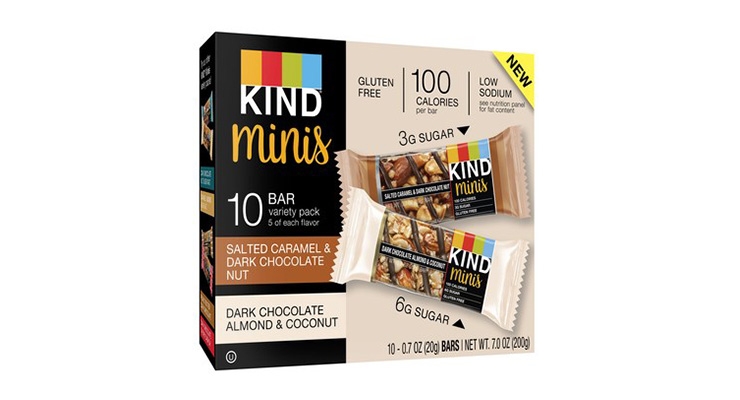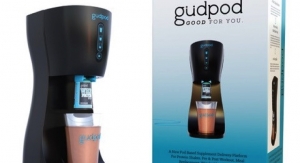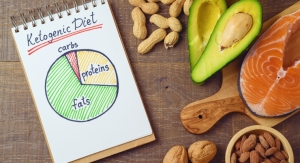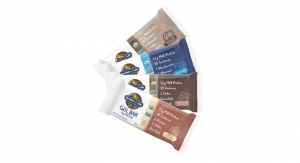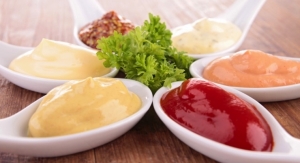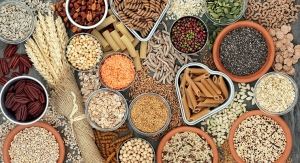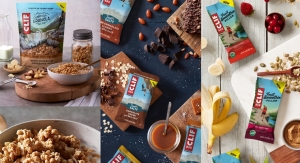11.13.18
KIND Healthy Snacks (KIND) has introduced KIND Minis, attempting to redefine the small portion snack category that has been comprised of empty calorie options for decades. To date, most food manufacturers have failed to make reduced portion snacks that effectively balance health and taste, the company said. The 100-calorie or less KIND Minis aim to fill a need for people seeking on-the-go snacks that not only taste good but also offer balanced nutrition.
"For years, 100-calorie snacks have enjoyed a health halo due to their smaller pack sizes and lower calorie count, but in reality they provide little nutritional value," said Daniel Lubetzky, founder and CEO of KIND. "With KIND Minis, we aim to turn the industry's approach to small portion single-serve snacks upside down. In so doing, we hope to shift the conversation so that it focuses less on quantity of calories and more on quality of ingredients."
When compared to bestselling lower calorie snacks on the market—from cookies and crackers to salty snacks—KIND Minis have more nutrient dense ingredients and provide a greater amount of positive nutrients, like protein and fiber, while containing less refined carbohydrates, the company claimed. KIND Minis have a nutrient-dense first ingredient: three bars lead with almonds; two lead with peanuts and one leads with cashews. Select bars also contain fruits, such as cranberries and cherries. Flavors include bestsellers such as Dark Chocolate Nuts & Sea Salt; Caramel Almond & Sea Salt; Peanut Butter Dark Chocolate; Dark Chocolate Cherry Cashew; Salted Caramel & Dark Chocolate Nut; and Dark Chocolate Almond & Coconut.
"Many leading miniature snacks are just smaller versions of their nutrient-deficient full-size counterparts. We opted to create a snack with a minimally processed, nutrient dense first ingredient like nuts versus enriched flour or refined sugar," said Stephanie Perruzza, RD, health and wellness expert at KIND.
"It is not surprising that the food industry has leaned on flours, sugars and corn as first ingredients because they are so cheap. For example, corn flour costs $0.23/pound, unbleached enriched flour costs $0.25/pound, and refined sugar costs $0.37/pound. In comparison, almonds cost roughly $2.85/pound and cashews cost $4.25/pound," said Mr. Lubetzky. "The choice to use low cost, highly processed ingredients comes at a significant cost to consumers' health, and can increase the risk of chronic diseases such as obesity and diabetes."
Research illustrates the market opportunity for bridge snacks like KIND Minis, as snacks now represent half of all eating occasions, and nine out of 10 consumers say they snack multiple times a day, according to the Hartman Group. While people snack for many reasons, a majority (63%) say they eat snacks for nutrition (according to Nielsen) and more than one third state they are replacing indulgent snacks with healthy ones (according to Mintel).
Ms. Perruzza added: "People are increasingly seeking options that are nutritious and delicious. We're excited to bring our nutrition credentials and desirable flavor combinations to an uninspired category and redefine it in a way that meets consumers' needs."
Lisa Young, PhD, RDN, an independent portion-size expert and author of Finally Full, Finally Slim: 30 Days to Permanent Weight Loss One Portion at a Time, is an advocate for choosing healthy portions of snacks. However, she stressed the importance of checking nutritionals before enjoying miniature snacks. "Consumers are surrounded by various portion sizes, including smaller snack packs that feature 100 calories but are lacking on nutrition. It's important to focus on both the quality and quantity of calories when making the most informed choices."
The KIND Minis introduction is consistent with KIND's heritage. In 2004, the company created a new healthy snack category when it unveiled a line of bars made with whole nuts and encased in a transparent wrapper. Since then, the company has rolled out more than 70 different snacks.
"For years, 100-calorie snacks have enjoyed a health halo due to their smaller pack sizes and lower calorie count, but in reality they provide little nutritional value," said Daniel Lubetzky, founder and CEO of KIND. "With KIND Minis, we aim to turn the industry's approach to small portion single-serve snacks upside down. In so doing, we hope to shift the conversation so that it focuses less on quantity of calories and more on quality of ingredients."
When compared to bestselling lower calorie snacks on the market—from cookies and crackers to salty snacks—KIND Minis have more nutrient dense ingredients and provide a greater amount of positive nutrients, like protein and fiber, while containing less refined carbohydrates, the company claimed. KIND Minis have a nutrient-dense first ingredient: three bars lead with almonds; two lead with peanuts and one leads with cashews. Select bars also contain fruits, such as cranberries and cherries. Flavors include bestsellers such as Dark Chocolate Nuts & Sea Salt; Caramel Almond & Sea Salt; Peanut Butter Dark Chocolate; Dark Chocolate Cherry Cashew; Salted Caramel & Dark Chocolate Nut; and Dark Chocolate Almond & Coconut.
"Many leading miniature snacks are just smaller versions of their nutrient-deficient full-size counterparts. We opted to create a snack with a minimally processed, nutrient dense first ingredient like nuts versus enriched flour or refined sugar," said Stephanie Perruzza, RD, health and wellness expert at KIND.
"It is not surprising that the food industry has leaned on flours, sugars and corn as first ingredients because they are so cheap. For example, corn flour costs $0.23/pound, unbleached enriched flour costs $0.25/pound, and refined sugar costs $0.37/pound. In comparison, almonds cost roughly $2.85/pound and cashews cost $4.25/pound," said Mr. Lubetzky. "The choice to use low cost, highly processed ingredients comes at a significant cost to consumers' health, and can increase the risk of chronic diseases such as obesity and diabetes."
Research illustrates the market opportunity for bridge snacks like KIND Minis, as snacks now represent half of all eating occasions, and nine out of 10 consumers say they snack multiple times a day, according to the Hartman Group. While people snack for many reasons, a majority (63%) say they eat snacks for nutrition (according to Nielsen) and more than one third state they are replacing indulgent snacks with healthy ones (according to Mintel).
Ms. Perruzza added: "People are increasingly seeking options that are nutritious and delicious. We're excited to bring our nutrition credentials and desirable flavor combinations to an uninspired category and redefine it in a way that meets consumers' needs."
Lisa Young, PhD, RDN, an independent portion-size expert and author of Finally Full, Finally Slim: 30 Days to Permanent Weight Loss One Portion at a Time, is an advocate for choosing healthy portions of snacks. However, she stressed the importance of checking nutritionals before enjoying miniature snacks. "Consumers are surrounded by various portion sizes, including smaller snack packs that feature 100 calories but are lacking on nutrition. It's important to focus on both the quality and quantity of calories when making the most informed choices."
The KIND Minis introduction is consistent with KIND's heritage. In 2004, the company created a new healthy snack category when it unveiled a line of bars made with whole nuts and encased in a transparent wrapper. Since then, the company has rolled out more than 70 different snacks.

